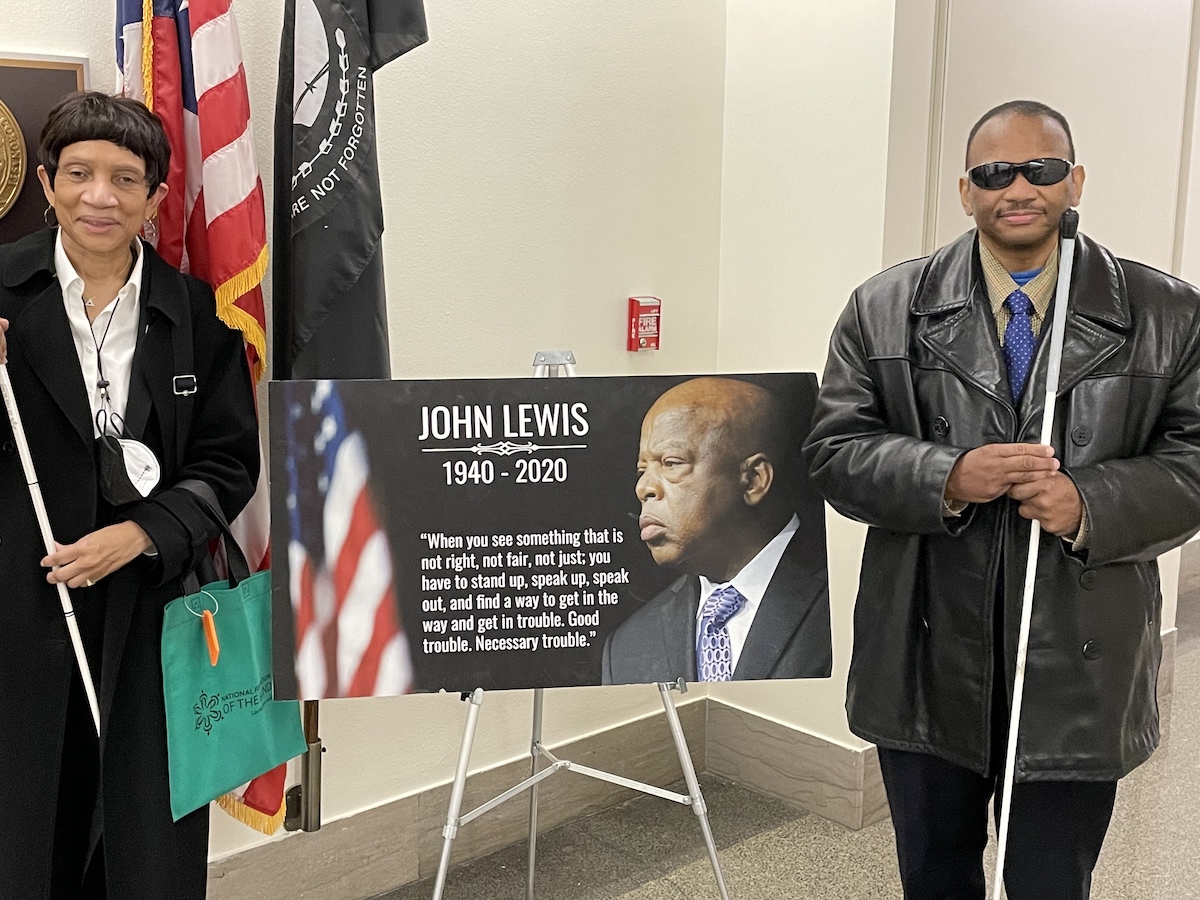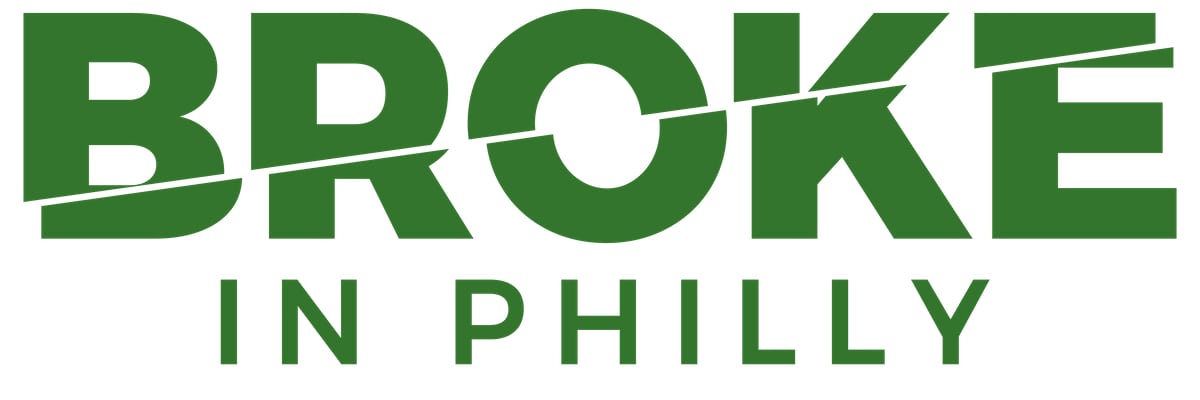“This is an exciting first step,” Scheu, who is blind and has used a sleep apnea machine more commonly known as a CPAP for the last two years, told Technical.ly. “If this bill goes through, we will have achieved a major victory for blind people.”
Also known as the Medical Device Nonvisual Accessibility Act of 2023, H.R. 1328 would amend the current Food, Drug and Cosmetic Act to “establish nonvisual accessibility standards for certain devices with digital interfaces.” The bill was introduced in March by US Rep. Jan Schakowsky, a Democrat from Illinois.
Advocacy efforts
As a member of the National Federation of the Blind (NFB), Scheu has presented her challenges with the device before Pennsylvania legislators. Each year between January and February, Federationists from across the United States meet with congress members from their respective home states and present the priorities which they hope to convince lawmakers to enact. Known as the Washington Seminar, the multi-day NFB event dates back to 1973.
Justin Young, NFB’s government affairs specialist, reports that this year, at least 400 members met in person with representatives while an additional number of meetings were held virtually. A delegation of 13 also traveled from across Pennsylvania and secured meetings with staff of all but four of the state’s 17 representatives, plus staff from the offices of Democratic senators Bob Casey and John Fetterman, said Emily Gindlesperger, legislative director for the NFB of Pennsylvania.
Thank you @SenBobCasey for your commitment to listening to disabled people and working with us to improve the lives of blind people. #NFBinDC pic.twitter.com/QhhMSwfJzH
— National Federation of the Blind (@NFB_voice) January 31, 2023
Of the NFB’s three priorities this year, two address technological barriers to persons who are blind or visually impaired, including one to remove technological roadblocks is the Websites and Software Applications Accessibility Act. Young said efforts are ongoing, but the act has yet to be introduced. The other is called the Blind Americans Return to Work Act.
The medical device bill notes that advancements in technology have led to many devices incorporating visual components such as screen displays, but without alternative nonvisual accessibility. Without these alternatives, “a blind or low-vision individual is unable to use it privately, independently, and safely,” the bill states.
The stakes of the bill
When Scheu first received her CPAP, a sighted medical professional did the initial setup, which Scheu is thankful she has not had to change.
“I have also traveled with my machine, and I just trust none of the settings have been messed up,” she said. Yet “the only way I can know for sure is having a sighted person check the screen.”
Scheu uses a machine made by ResMed whose newer models feature a touch screen display that can be even more inaccessible for someone visually impaired. ResMed labels itself as a leader in cloud-based medical technologies, and is just one of a growing field of manufacturers of at-home devices that purport to lower healthcare costs and avoid hospital stays. Technical.ly made several attempts to reach the company for comments, but calls and emails were not returned.

Philadelphia members of the National Federation of the Blind in front of tribute to late Rep. John Lewis. (Courtesy photo)
If passed, the Act would allow the FDA to not only promulgate nonvisual accessibility standards, but also provide training in compliance. Some nonvisual examples include voice commands, prompts and tactile buttons. The requirements will affect all FDA-approved class 2 and class 3 devices such as monitors, ports and in-home chemotherapy treatments, particularly those with “screen or mobile application through which a human user interacts or communicates with the device by inputting or receiving information.” Many of these machines feed readings and results directly to healthcare providers, so accurate usage is critical.
The FDA will have one year after enactment to announce the proposed changes and another two years to issue the final requirements and definitions of noncompliance. Manufacturers will then have one year to comply. The bill does allow for exemptions, but only if there is a “fundamental alteration to the nature of the product or an undue hardship for the manufacturer.”
The intent is not to impose a burden on manufacturers. In fact, the bill states, any additional costs are minimal, provided the accommodations are implemented at the start of design.
Continued efforts
NFB representatives said this bill is one example of how their efforts can effectively raise awareness to the larger society.
“Washington Seminar is very important because it helps us educate congressmen on our priorities [as we] fight for the rights and equities everyone else has,” Young said.
Republican Rep. Brian Fitzpatrick is one of 44 original cosponsors of the bill.
“Millions of Americans live with blindness and vision loss, and still need access to critical medical devices,” he said in a provided statement. “The bipartisan Medical Device Nonvisual Accessibility Act ensures that those dealing with blindness or low vision can easily access health and medical devices and improve outcomes for patients, and I am proud to be an original co-sponsor.”
The bill still needs to be introduced in the Senate.
While Scheu is grateful for the legislative progress and for what some companies are already doing, she also noted the struggle continues.
“Although a few devices are now accessible, much more needs to be done,” she said. “Accessibility promotes independence and thus enables more people to stay in their own homes.”

Technical.ly is one of more than 25 news organizations producing Broke in Philly, a collaborative reporting project on solutions to poverty and the city’s push towards economic mobility.
Before you go...
Please consider supporting Technical.ly to keep our independent journalism strong. Unlike most business-focused media outlets, we don’t have a paywall. Instead, we count on your personal and organizational support.
3 ways to support our work:- Contribute to the Journalism Fund. Charitable giving ensures our information remains free and accessible for residents to discover workforce programs and entrepreneurship pathways. This includes philanthropic grants and individual tax-deductible donations from readers like you.
- Use our Preferred Partners. Our directory of vetted providers offers high-quality recommendations for services our readers need, and each referral supports our journalism.
- Use our services. If you need entrepreneurs and tech leaders to buy your services, are seeking technologists to hire or want more professionals to know about your ecosystem, Technical.ly has the biggest and most engaged audience in the mid-Atlantic. We help companies tell their stories and answer big questions to meet and serve our community.
Join our growing Slack community
Join 5,000 tech professionals and entrepreneurs in our community Slack today!

The person charged in the UnitedHealthcare CEO shooting had a ton of tech connections

From rejection to innovation: How I built a tool to beat AI hiring algorithms at their own game

Where are the country’s most vibrant tech and startup communities?




